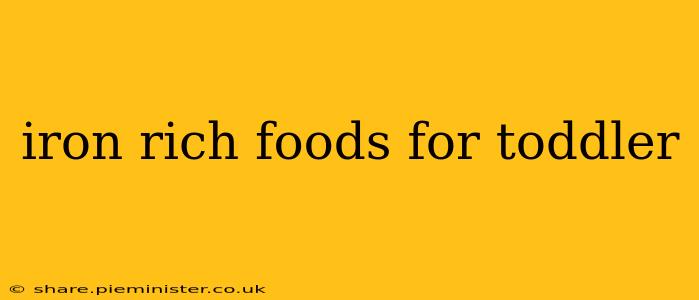Iron is a crucial nutrient for toddlers, playing a vital role in their growth and development. Iron deficiency can lead to anemia, impacting energy levels, cognitive function, and overall well-being. Ensuring your toddler gets enough iron through their diet is paramount. This guide explores excellent iron-rich food options suitable for little ones, addressing common parental concerns.
What are the best iron-rich foods for toddlers?
Many delicious and nutritious foods are packed with iron. The key is to incorporate a variety of these into your toddler's diet to ensure they receive a balanced intake. Here are some top choices:
- Meat: Red meat (beef, lamb), chicken, and turkey are excellent sources of heme iron, the most easily absorbed type of iron. Offer small, tender pieces of cooked meat.
- Iron-Fortified Cereals: Many baby cereals and toddler cereals are fortified with iron. Check the nutrition label to ensure a significant iron content. These are often a convenient and easy way to boost iron intake, especially during breakfast.
- Legumes: Lentils, beans (kidney, black, pinto), and chickpeas are good sources of non-heme iron. Pureed or mashed legumes can be easily incorporated into soups, stews, or dips.
- Dark Leafy Greens: Spinach, kale, and collard greens are rich in iron, although non-heme iron absorption from plant sources is lower. Pureeing these greens into sauces or adding them to smoothies can help disguise the taste.
- Eggs: Both egg yolks and whites contain iron. Scrambled eggs, omelets, or hard-boiled eggs are easy toddler-friendly options.
- Dried Fruits: Raisins, apricots, and prunes are good sources of iron, but should be offered in moderation due to their sugar content. They can be added to oatmeal or yogurt.
- Iron-Fortified Formula: If your toddler is still on formula, choose an iron-fortified variety.
How much iron does my toddler need?
The recommended daily allowance of iron for toddlers varies depending on age and other factors. Consult your pediatrician or a registered dietitian for personalized recommendations based on your child's individual needs. They can assess your child's iron levels and provide tailored dietary advice.
What foods help increase iron absorption?
The absorption of non-heme iron (found in plant-based foods) can be improved by consuming it with foods rich in vitamin C. Pair iron-rich plant foods with foods like:
- Citrus fruits: Oranges, grapefruits, and lemons.
- Strawberries: A sweet and delicious way to boost iron absorption.
- Bell peppers: Especially red bell peppers, which are high in vitamin C.
My toddler is a picky eater. How can I get them to eat iron-rich foods?
Picky eating is common in toddlers. Here are some strategies:
- Make it fun: Use cookie cutters to shape foods, create fun faces on plates, or involve your toddler in meal preparation.
- Introduce foods gradually: Don't overwhelm your toddler with new foods all at once. Introduce them one at a time and offer them repeatedly.
- Be patient and persistent: It can take multiple exposures to a new food before a toddler accepts it.
- Offer a variety of textures and flavors: Toddlers have different preferences, so offering a variety will increase the chances of them finding something they like.
- Don't force your toddler to eat: Forcing them can lead to negative associations with food.
Is it okay to give my toddler iron supplements?
Only give iron supplements to your toddler if your pediatrician or doctor recommends them. Iron supplements should only be administered under professional guidance, as an overdose can be harmful. A blood test can determine if your child has an iron deficiency requiring supplementation.
Are there any foods I should avoid giving my toddler when trying to increase their iron intake?
Certain foods can interfere with iron absorption. While not needing to be completely avoided, minimizing consumption of these foods alongside iron-rich meals is advisable:
- Dairy products: Milk and dairy products can inhibit non-heme iron absorption. Consume them separately from iron-rich plant sources.
- Phytates (found in whole grains): Phytates can bind to iron and reduce its absorption. While whole grains are beneficial, don’t serve them with iron-rich meals.
This information is for general knowledge and does not substitute professional medical advice. Always consult your pediatrician or a registered dietitian for personalized recommendations regarding your toddler's dietary needs and iron intake. They can assess your child's individual situation and offer tailored guidance to ensure optimal health and development.
